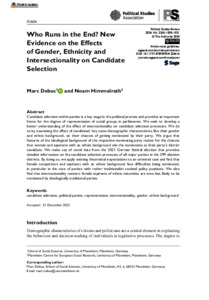|
Who runs in the end? New evidence on the effects of gender, ethnicity and intersectionality on candidate selection
Debus, Marc
;
Himmelrath, Noam
![[img]](https://madoc.bib.uni-mannheim.de/66561/1.hassmallThumbnailVersion/debus-himmelrath-2024-who-runs-in-the-end-new-evidence-on-the-effects-of-gender-ethnicity-and-intersectionality-on.pdf)  Vorschau |
|
PDF
debus-himmelrath-2024-who-runs-in-the-end-new-evidence-on-the-effects-of-gender-ethnicity-and-intersectionality-on.pdf
- Veröffentlichte Version
Download (534kB)
|
|
DOI:
|
https://doi.org/10.1177/14789299241226616
|
|
URL:
|
https://journals.sagepub.com/doi/10.1177/147892992...
|
|
URN:
|
urn:nbn:de:bsz:180-madoc-665617
|
|
Dokumenttyp:
|
Zeitschriftenartikel
|
|
Erscheinungsjahr:
|
2024
|
|
Titel einer Zeitschrift oder einer Reihe:
|
Political Studies Review
|
|
Band/Volume:
|
22
|
|
Heft/Issue:
|
4
|
|
Seitenbereich:
|
1000-1021
|
|
Ort der Veröffentlichung:
|
Oxford
|
|
Verlag:
|
Wiley-Blackwell
|
|
ISSN:
|
1478-9299 , 1478-9302
|
|
Sprache der Veröffentlichung:
|
Englisch
|
|
Einrichtung:
|
Fakultät für Sozialwissenschaften > Politikwissenschaft, Vergleichende Regierungslehre (Debus 2012-)
Außerfakultäre Einrichtungen > MZES - Arbeitsbereich B
|
|
Fachgebiet:
|
320 Politik
|
|
Freie Schlagwörter (Englisch):
|
candidate selection , political parties , representation , intersectionality , gender , ethnic background
|
|
Abstract:
|
Candidate selection within parties is a key stage in the political process and provides an important frame for the degree of representation of social groups in parliaments. We seek to develop a better understanding of the effect of intersectionality on candidate selection processes. We do so by examining the effect of candidates’ key socio-demographic characteristics, like their gender and ethnic background, on their chances of getting nominated by their party. We argue that features of the ideological background of the respective nominating party matter for the chances that women and aspirants with an ethnic background win the nomination as their party’s district candidate. We make use of novel data from the 2021 German federal election that provides detailed information on the candidate selection processes of all major parties in the 299 election districts. By doing so, we apply existing theoretical expectations to an untested case and find that female competitors and aspirants with an ethnic background face difficulties being nominated, in particular in the case of parties with rather traditionalist societal policy positions. We also find that intersectionality matters: female aspirants of ethnic minorities are even less likely to be nominated by ideologically traditional parties.
|
 | Dieser Eintrag ist Teil der Universitätsbibliographie. |
 | Das Dokument wird vom Publikationsserver der Universitätsbibliothek Mannheim bereitgestellt. |
 Suche Autoren in Suche Autoren in
Sie haben einen Fehler gefunden? Teilen Sie uns Ihren Korrekturwunsch bitte hier mit: E-Mail
Actions (login required)
 |
Eintrag anzeigen |
|
|
 ORCID: 0000-0002-7151-7942 ; Himmelrath, Noam
ORCID: 0000-0002-7151-7942 ; Himmelrath, Noam



 Suche Autoren in
Suche Autoren in